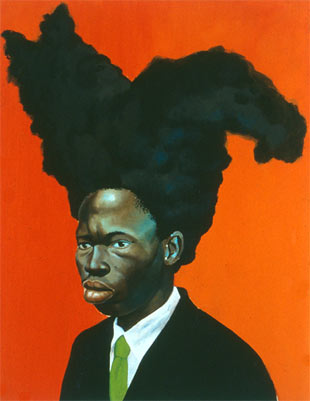
Outside of the Tribeca Film Festival and other smaller efforts, anyone who lives in New York City and has a hankering to attend a collection of screenings has to either head straight to Cannes or at least to the West Coast. To find gay cinema, the average New Yorker will have to either purchase that ticket to San Francisco or set the remote for the LOGO channel. Moreover, to find a gay BLACK film festival is like the proverbial needle in a haystack; some aren't publicized well, are in Atlanta and DC during the circuit party weekends, or on the West Coast.
Enter the Queer Black Cinema (QBC) Film Festival, a monthly compendium of works by black LGBTQ directors. Although it would seem that the category is relatively dismal, QBC- in its inaugural year- has managed to showcase films from little-known (Ken Jackson, Tina Mabry) to more established (Patrik Ian Polk) gay directors of color for the last 12 months at the Gay and Lesbian Center in the West Village.
Now, by queer cinema I'm not talking about "Dreamgirls" (although judging from the core audience at my screening the other night, it could definitely be labeled as such!), but rather movies and short stories that have their origins begat at the hand of black gay men and women. Although the submissions' subject matter doesn't necessarily have to deal with issues surrounding being gay, the QBC is attempting to highlight the talents and life's dreams of its homo creators. Kudos to Angel Brown and Kawana Bullock for bringing OUR stories, in all of their variety, to one place for all of us to appreciate. I had the pleasure of attending the last festival screening of the 2006 season on December 20th. The rather diverse crowd was treated to a screening of "Forgiven" by Kenya Briggs and "The DL Chronicles Episodes 1 (Wes) and 2 (Robert) by Deondray Gossett and Quincy LeNear.
"Forgiven" is a well-written (though not necessarily a well shot or editted ) short film surrounding the issues of race, forgiveness, mortality and religion and how it affects the friendship of two elderly women. Interestingly enough, the main character's sexuality has little to do with the movie; for that Bringgs should be commended. Very often we assume that because a film includes a gay character that the movie has to be about their sexuality, which is a mistake. The focus of "Forgiven" centers around what the lesbian main character learns as a HUMAN being, not just a SEXUAL one. Given a little bit more of a budget, the powerful message of the film could be even better fleshed out and more compelling.
The feature films of the night were two episodes of "The DL Chronicles", namely episodes 1 (Wes) and 2(Robert). Episode 1 (Wes) marks directors/writers Deondray Gossett and Quincy LeNear's foray into territory not covered by "Noah's Arc" or Oprah; namely, the TRUE issues surrounding being a black man questioning and/or hiding his sexuality in a society that doesn't really allow him to do either. If he questions, then he is viewed as less of a man, less of a person, less of a contributor to the diaspora. If he hides it, then he is a pariah, a duplicitous agent in the sexual politics of queer/gay identified organizations who believe he should put it all on the table for all to see. "The DL Chronicles" personalizes those who posess these struggles, and does quite a riveting job of being a realistic portrayal of what it is to be gay and not feel like you fit in ANYWHERE.

In episode 1 Wes, an investment banker, is married but unable to question his sexuality until a chance meeting with a stranger on the street brings those thoughts to the forefront. He is also unable to hide his sexuality when his wife's brother comes for a rather life-changing "visit". Well fleshed-out and wonderfully paced, it definitely gives an authentic feel to the down-low "phenomenon"- examining the pain that it inflicts upon the individual and the strength that those who walk in this existence must summon to continue to "live".

Episode 2 (Robert) offers a little bit more of a light-hearted view. When Robert meets the object of his desire Austin at a health food store, his "straight"-laced existence is turned upside down. He is faced with the truth of his desire, and the ramifications it may have on his job, his daughter, and ultimately on Austin. While possessing perhaps more levity than the first episode (courtesy of Austin's "good good girlfriend" and co-worker), the themes of secrecy and ultimately acceptance are again explored. I am told that The DL Chronicles is in the midst of being developed into a TV Show. I can't wait.
There aren't enough film festivals that show me my image on the big screen. I want my QBC!!!


No comments:
Post a Comment